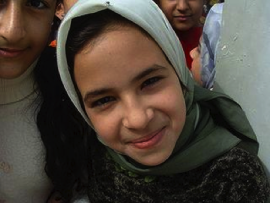By Marcela De Vivo, mother of a child with a severe disability and freelance writer who works with Oltarsh law firms. She writes on immigration law, health and special education law and inclusion.
For any family, providing the best care and support for an autistic child presents numerous challenges. In a family of immigrants, dealing with autism can be overwhelming, from diagnosis to treatment. In particular, immigrants may lack access to a secure healthcare network, making solutions seem inaccessible. Here are some things to think about:

Image Courtesy of Christian Briggs/Wikimedia Commons
Diagnosis and denial
Within some cultures, there simply is no frame of reference for a problem such as autism, so immigrants can sometimes not see their children’s symptoms or resort to inappropriate coping mechanisms.
Signs of autism, such as poor social skills or repetitive physical ticks, can be registered as stubbornness or a cause for shame for those who lack the education to understand that their child has a mental disease. As a result, parents might punish their child or pretend that the symptoms are not there. To make matters worse, immigrant parents who recognize that there is an obvious problem can be misinformed about the implications of autism. Some families, for example, think that if they are “caught” with an autistic child, they could be deported (which, in some countries, is not an unreasonable fear).
In some isolated cases, parents have failed to notice any symptoms whatsoever. In others, frustrated fathers have abandoned their autistic children, in part because they did not have an adequate concept of mental illness and may even think the problem is their fault.
They may keep the child out of the public eye, for instance, not wanting to incite neighborhood gossip. Among immigrant mothers, being a single parent can be even more challenging when rearing a special-needs child, since she may lack the documentation, status or money to provide appropriate therapy.
Cultural barriers to treatment

Image Courtesy of Tim Vickers/Wikimedia Commons
Since autism is an affliction that affects our relationship to language and communication, getting treatment for the diagnosis is difficult in a multi-lingual household. If a specialist must rely on a translator to interact with a child—as well as the parents—he or she may miss some of the nuances of the child’s dialog. A lack of understanding of idiom or regional body language might cause an inaccurate diagnosis or stand in the way of therapy.
On top of strictly linguistic barriers that may exist between doctors and immigrant families, there can be cultural barriers as well.
On the doctor’s side, the fact is that he or she may be making all judgments based on a body of knowledge that does not reflect many world cultures. While over six million culturally diverse children in the U.S. have communication disorders, such as autism, almost all of studies done on autism have been conducted with European-American families.
It is a strong likelihood that the data a doctor relies on may have a cultural skew. Furthermore, many American doctors may not have an understanding of certain taboos and customs of communication, potentially offending or confusing the family and making open dialog more improbable.
Finally, many cultures don’t have a true concept of mental illness; this often makes it difficult to provide solutions. Islamic parents, for example, may think that not to raise their child as they would a normally-functioning child may be an insult to their god, therefore, they forsake treatment.
To overcome these difficulties, immigrant families must make sure language and cultural differences are minimized. The ideal scenario would include a doctor who is a native speaker or highly fluent in the child’s language. As this is not always possible, it’s essential to have a translator who is not only appropriately bilingual, but also savvy to concepts in mental health and the mores of the child’s culture.
Its important that at least one person is an insider within both cultures to make sure that the diagnosis is not based on a misunderstanding and that the reasons for treatment can be explained in context. With adequate language and cultural mediation, autism need not be yet another unneeded stressor for immigrants.
